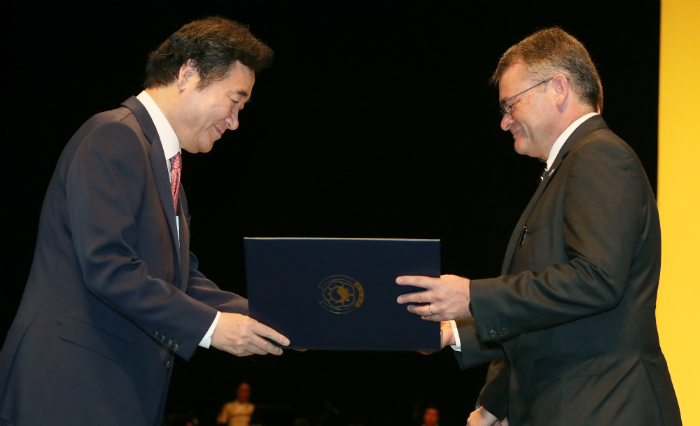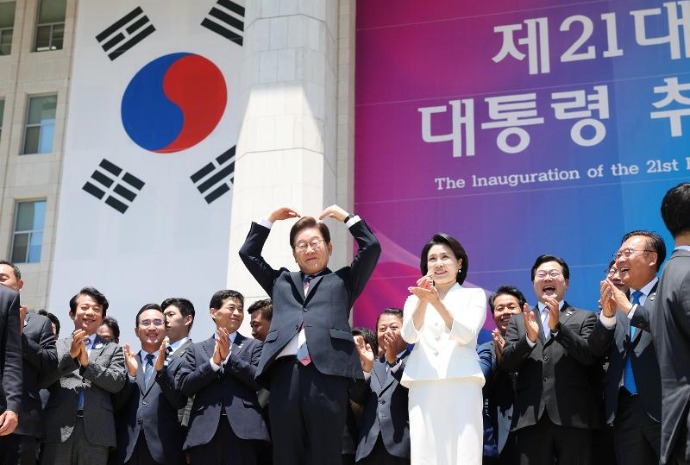
Prime Minister Lee Nak-yon (left) presents an award to Antonio Domenech, a professor of Korean Studies at the University of Malaga in Spain, as part of a celebration to mark the 571st Hangeul Day, at the Sejong Center for the Performing Arts on Oct. 9. (Ministry of Culture, Sports and Tourism)
By Hur SomEe and Kim Young Shin
Antonio Domenech, a Korean Studies professor at the University of Malaga in Spain, has now become the first non-Korean recipient of the hwagwan flower crown Order of Cultural Merit for his services to developing the Korean language and for his special interest in Korea.
Professor Domenech lived in Korea for 10 years starting in 1992 to study the Korean language and society, and to communicate with people in Korea.
In 2002 he received his master’s in Asian religions from Sogang University and returned to Spain. He wrote his thesis on Korean myths at the Universidad Autonoma de Madrid. He currently gives lectures on the Korean language, heritage and literature at the University of Malaga in Spain.
“Because of Korea, my perspective on life has changed,” said Professor Domenech. Korea.net asked him about his studies.
- How did you become the first non-Korean recipient of the hwagwan flower crown Order of Cultural Merit?
In 2007, I published my thesis, “Korean Writing and the Creation of the Korean Alphabet: Hangeul,” and it helped the Korean language get a lot of attention from people in Spain and South America. Also, my other publications about the Korean language and Korean heritage also contributed to Korean studies more broadly. That’s the reason why I got the award.
- What topics are your Korean studies theses about? Why did you choose them?
My theses mainly deal with the Korean concept of woori (우리), the notion of the collective self.
People in Korea live in woori communities, such as the “woori family" or the “woori neighborhood." I looked at how such notions change over time, and if society is turning into another form or “woori society" that prefers individualism.
I also write books about the Korean language, heritage, religion and Korean-Spanish translations.
I’m particularly interested in religion and philosophy. As an anthropologist, I’m studying the relationship among Buddhism, Christianity, shamanism and Confucianism in today's Korean society, and what roles men and women play in those religions.
- What will your next book be about?
The evolving Korean society.
I want to think about the impact of cultural heritage and traditional thinking on the development of new technologies, especially on artificial intelligence and robotics. I also want to study the development of technology and culture and its religious expressions.
- As a Spaniard who loves Korea, what is your message to the Korean people?
If I hadn't experienced Korea, I wouldn’t be the person I am today.
As a person who loves Korea and who studies the country, I want to urge people in Korea to be proud of their language, arts and heritage. Korea has endless charms and there is still a lot to share with the international community.
sehp91@korea.kr
